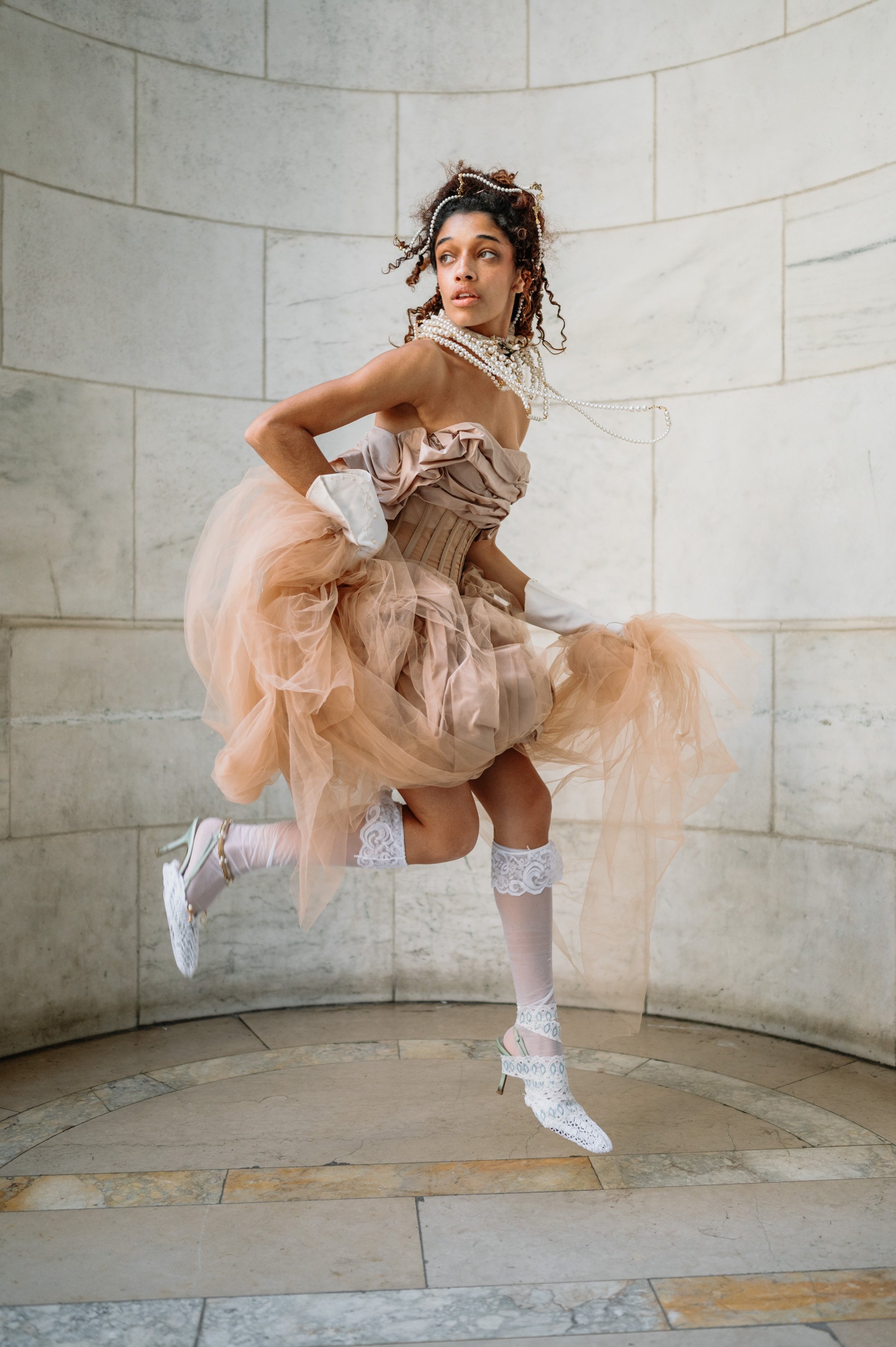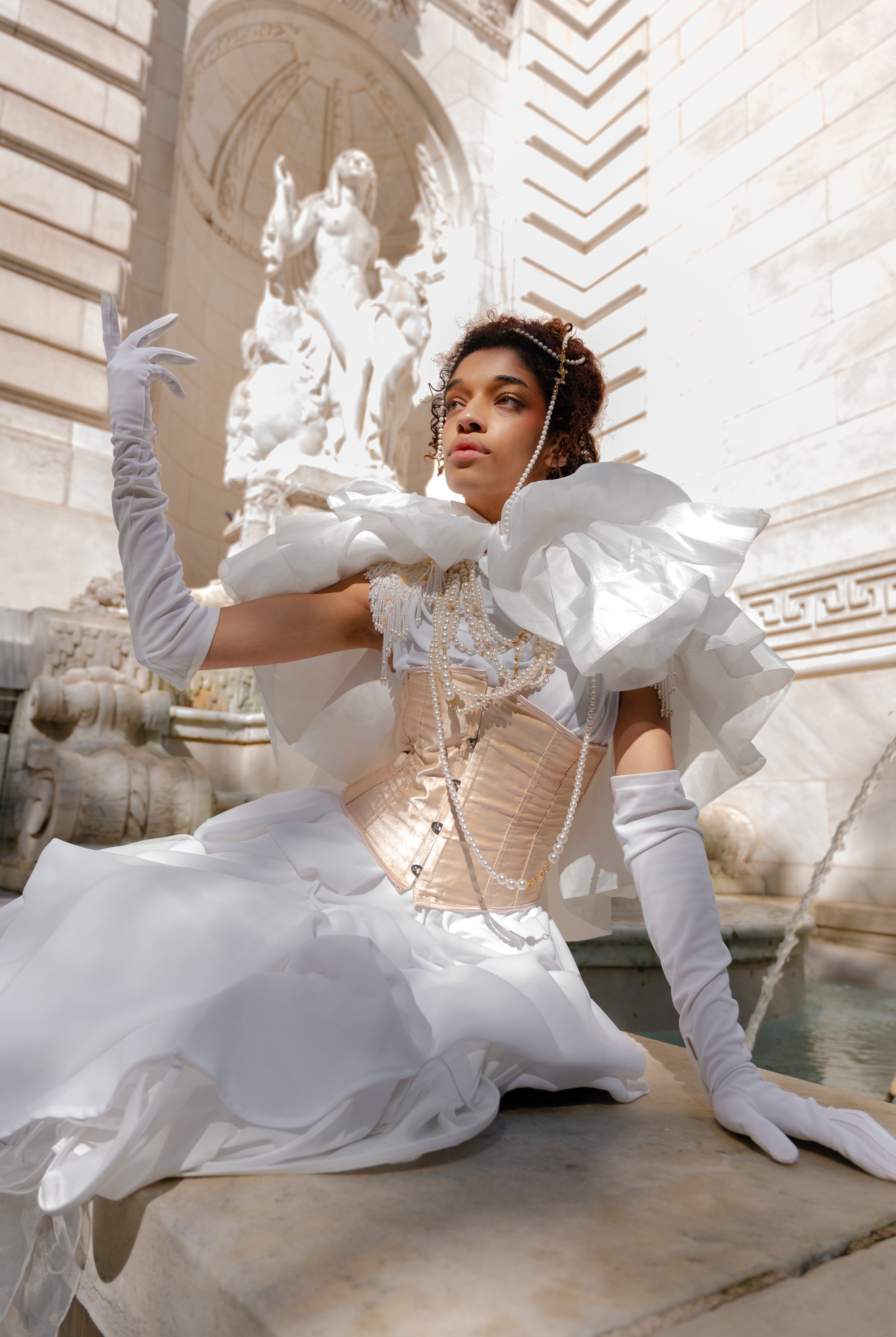Clear the Era
The zeitgeist of today; the product of yesterday, and the blueprint for tomorrow.
Dress by IRY Designs Website/Instagram, Lace choker by Sarah Marie, and Pearls by Heaven.ly by Sanem Kara (styled by Monica Robles and Sarah Galinger)
Every fashion movement derives from a previous one, and the latest trend consuming us is a revision of the past. Industries create new successes by analyzing previous successes and then pivoting. It takes a true innovator to introduce to the world something genuinely original, especially in the overstimulating industry of fashion. An industry backed by history, perception, and human behavior. How can we evolve beyond this calculation of fashion that the business side has instilled?
When flipping through a fashion textbook, an analysis of the 20th-century women's style eras is mentioned without fail. The roaring 1920s screams flapper chic, while the '30s regresses into conservatism. The 1940s and '50s represent overtly feminine silhouettes, and the '60s and '70s are an innovative psychedelic trip. The '80s essentials are shoulder pads and too much hairspray. Then, the '90s and Y2K fashion prove that the youth rules and tackiness is actually super cute.
References to past eras appear in the market to a great extent, whether recognized or unknown to the new consumer. To our individualistic advantage, the status quo of 'proper style' has retired, and trends are presented to us as a melting pot of everything—from everywhere, from every era. The freedom to mix and match as we please is ours to exploit.
Venus Corset by Heaven.ly by Sanem Kara, CrInoline by Juine J.Y Wang (styled by Monica Robles)
Far in the future, when our current livelihoods are translated into grasping history and archetypes for students to read about, what will be our highlight in fashion innovation? Perhaps, the sustainability movement we've inevitably hit, the rise of the meta-verse and digital fashion, or even our 5-second attention span crafting the pace of the rapid trend cycle. Streetwear, vintage revival, and social media exposure ooze uniqueness upon our tastes, and we, as individuals, strive more to stand out than fit in with the crowd.
The sensational acceptance developed for the personalities and peculiarities in current times is the innovative push of this new decade. The pattern of uniformed decade fashion is obsolete; our tastes have become too far and too many. Style tribes, subcultures, and "core" aesthetics are all attributes of the diverse clothing choices of the now. Exposure and access to the internet, museums and schooling allow creativity to run wild. Hypothetically, a 'ballet-core' revived Tumblr post persuades us to buy a new baby pink activewear set. At the same time, the Moulin Rouge play on Broadway inspires us to acquire an early 1900's style corset, and last season's Versace collection inclines us to sport 6-inch platform pumps. All of these trends derive from entirely different outlets, yet the items will simultaneously exist in wardrobe harmony if the individual desires them.
Future textbooks will be twice as long in order to capture the variety of the 2020's fashion zeitgeist, clearing preconceived notions of what is era-defining in fashion and representing the vast realities of modern nature. Much of fashion is made up of the existential style of decades past, and those ingenious revelations will continue to inspire. However, may we no longer abide by the traditions and calculation of industry standards.
Dress and headpiece by Juine J.Y Wang, Pearl necklace by Heaven.ly by Sanem Kara (styled by Monica Robles)
Models: Thomas Mauro and Nova Krasner
Photographer: Allie Simms
Stylist, Fashion Director: Monica Robles
Stylist: Sarah Galinger
Assistant Stylist: Macyn Terrell
Makeup Artist: Jade Burdman
Hair Stylist: Rhia McGowan
Set Assistant: Nadia Adams
Videographer, Production and Set Director: Luna Abreia
Editor-in-Chief, Creative Director: Pilar Bradley
Photo Director, Creative Director: Kervens Jean
Beauty Director: Gillian Tokar
Managing Editor: Nova Krasner
Social Media and Public Relations Director: Maddie Paradise
Graphic Designer: Antara Sharma
Writer, Fashion Editor: Audrey Tobin




